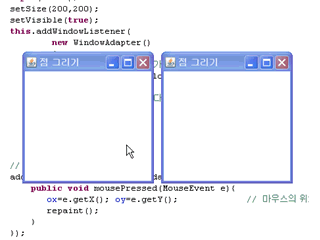

("Unicode code point at index " + index + " is " + codePoint) Int codePoint = dePointAt(index) // get the Unicode code point value

Int index = 4 // index for which we want to find the Unicode code point String myString = "Hello, world." // example string Here’s a sample Java code that does this: You can use the `codePointAt()` method provided in Java’s `String` class to determine the Unicode code point value of a character at a given index in a string. We will look at an example program that demonstrates this and discuss some important points about using this method.
#Codepoints java offset how to#
Is negative or greater than this.This blog post explains how to use the `codePointAt()` method provided in Java’s `String` class to determine the Unicode code point value of a character at a given index in a string. Throws: IndexOutOfBoundsException - if dstOffset end - the end index of the subsequence to be inserted. start - the starting index of the subsequence to be inserted. Parameters: dstOffset - the offset in this sequence. Start, and less than or equal to the length of s.Ĭharacters "null". The end argument must be greater than or equal to The start argument must be nonnegative, and not greater than The dstOffset argument must be greater than or equal to Sequence, if k is greater than or equal to

start - the starting index of the subsequence to be appended. Specified by: append in interface Appendable Parameters: s - the sequence to append. N otherwise, it is equal to the character at indexĬharacters as if the s parameter was a sequence containing the fourĬharacters "null". Index k in this character sequence becomes equal to theĬharacter at index k in this sequence, if k is less than Let n be the length of this character sequence just prior toĮxecution of the append method. Of this sequence is increased by the value of end - start. This sequence up to the (exclusive) index end. Index start, are appended, in order, to the contents of Since: 1.5 See Also: StringBuffer,Īppends a subsequence of the specified CharSequence to thisĬharacters of the argument s, starting at Or method in this class will cause a NullPointerException to be Unless otherwise noted, passing a null argument to a constructor If such synchronization is required then it is Instances of StringBuilder are not safe for

If the internal buffer overflows, it is automatically made larger. The capacity, it is not necessary to allocate a new internalīuffer. As long as the length of theĬharacter sequence contained in the string builder does not exceed In general, if sb refers to an instance of a StringBuilder,Įvery string builder has a capacity. Z.insert(4, "le") would alter the string builder to The method call z.append("le") would cause the string Whose current contents are " start", then Of the builder the insert method adds the characters atįor example, if z refers to a string builder object TheĪppend method always adds these characters at the end Each effectivelyĬonverts a given datum to a string and then appends or inserts theĬharacters of that string to the string builder. Overloaded so as to accept data of any type. The principal operations on a StringBuilder are the StringBuffer as it will be faster under most implementations. It is recommended that this class be used in preference to Used by a single thread (as is generally the case). StringBuffer in places where the string buffer was being This class is designed for use as a drop-in replacement for With StringBuffer, but with no guarantee of synchronization.


 0 kommentar(er)
0 kommentar(er)
